Our Final Day …
Bill: It was interesting to wrap up our trip at the stops we visited today, eh, boss?
Chris: I’d call it an eclectic day, with everything from Australian natives to green seeds.
Bill: Our first stop, Suncrest Nurseries, hosted five companies with a diverse range of specialties from herbs and vegetables to annuals and perennials, with a nursery shrub-slash-cut flower thrown in for good measure. Stop number two, Benary, was sort of a throwback to the good old days of Pack Trials, with big grow-outs of their A-to-Z assortment on benches, in packs and pots.
Chris: About the only thing they didn’t have was multiple sowings to show off the earliness of their intros! Okay, Bill, kick off things with Hishtil.
Cohen, Hishtil & Jaldety
Bill: On our way through the greenhouse to our first breeding company stop, Hishtil, we saw a lot of vegetative annuals supplied by another Israeli company, Cohen, which provides cuttings of third-party genetics. We recognized many of the new varieties we’ve seen at CAST 2022 from breeders like Suntory, Westhoff, Volmary and others. Our tour guide, Asaf, called out Surdiva Scaevola, Crazytunia Petunias and Madeira Argyranthemum as some of his favorites on display.
Chris: As a company, Hishtil had two messages. First, they’re putting more emphasis on herbs and less on their annuals and perennials. Second, they’ve been putting a strong emphasis on being “green” and we saw this mission in action within their range of herbs, which they're working on converting to organic. Their goal, in fact, is to be 100% organic … but that’s admittedly a challenge. For this year, they’ve launched one Lavender stoeches, Kew Red, as their first fully organic offering.
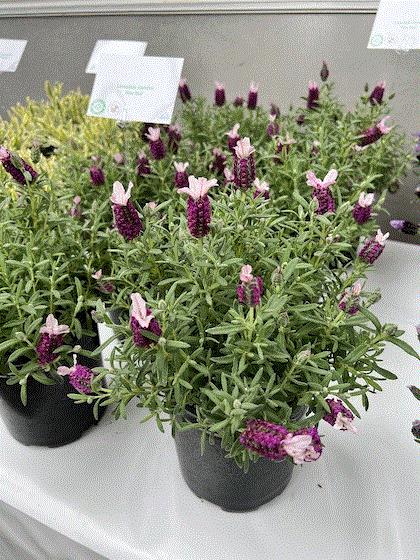
Lavender Red Kew
Bill: Two more new lavender introductions from Hishtil couldn’t have been more different. The LavLov series of Spanish lavender is touted for its earliness and compact habit, launching with Blue, Dark Blue, Purple, White and Deep Purple. On the opposite end of the spectrum was a Lavandula canariensis—so new it’s hasn’t even been given a trade name. It’s a Canary Islands-native that has extremely long flower stems (use it for cut flowers!), good drought tolerance and a full measure of uniqueness. It’s one to check out for sure.
Lavandula canariensis and its bloom
Chris: Hishtil may be focusing on herbs, but they haven’t given up on ornamental plants, thankfully, because we saw some quirky genera that were completely new to us. How about Zaluzianskia ovata, a South Africa native commonly known as Night Phlox. It grows at high altitude, so probably would be good for rock gardens. Or pots, of course. Interestingly, it’s a nocturnal bloomer, no doubt to attract some sort of nocturnal pollinator like moths. But we were there at 10:00 a.m. and saw plenty of flowers. There were two varieties, Orange Eye (mounded) and Star Balsam (upright). They’re said to be good sellers in the UK.
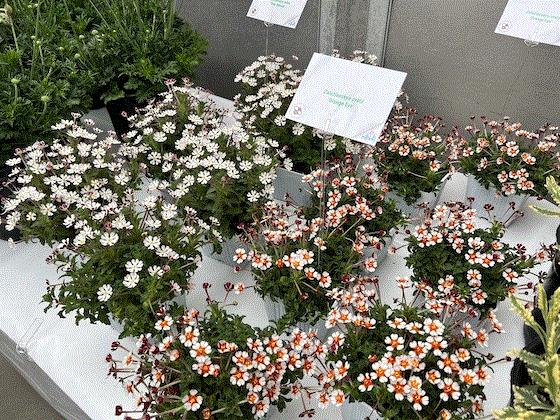
Zaluzianskia ovata or night phlox
Bill: Okay, time to talk interesting herbs. Two that I really liked from Hishtil were Rosemary Green Ginger, which truly has a ginger fragrance and flavor; and Santolina viridis Lemon Fizz, which smells and tastes like—get this—olives! They now have two santolinas, one dark green and one light green, so you can combine the two in a pretty mixed bowl.
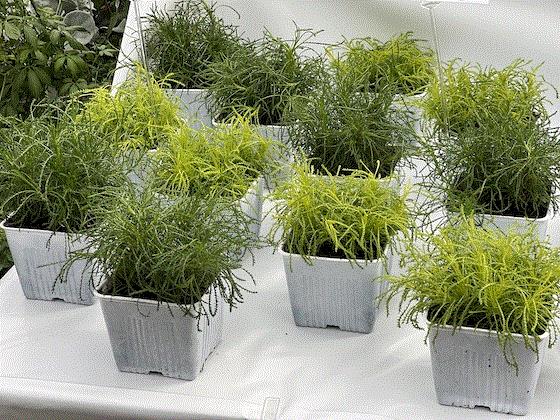
Santolina viridis and the light green Lemon Fizz version.
Chris: You tasted everything on offer at Hishtil, Bill. So what did you think of the Ziziphora clinopodoides we saw—tasted minty, right?
Bill: You just wanted to prove you could spell that species, boss. But, yes, it was very minty. And that herb is cool because it gets covered with little white flowers and loves cold conditions.
Chris: That’s because ziziphora is found in the mountains of Israel, apparently—even thriving under snow! If you're curious about ziziphora and all the other varieties from Hishtil, click HERE to check out our video from our visit.
Okay, on to another Israeli company, Jaldety, and their interesting perennials and succulents.
Bill: I’m a succulent fan and Jaldety has some really interesting sedums to add to their collection. Such as Royal Pine, with a texture that looks like the tips of pine branches; Gold Dust, a low-growing little chartreuse carpet of softness, and Majestic Kiss, with little lip-shaped foliage (if you look at it closely).
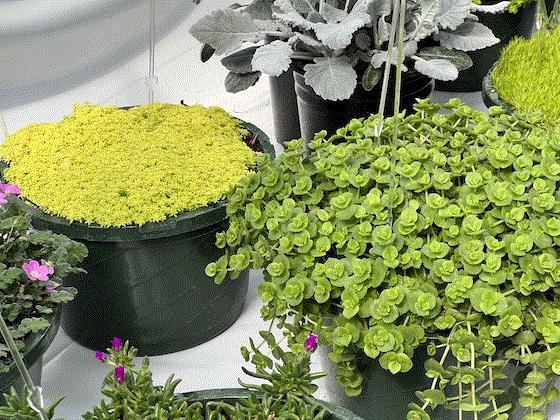
Gold Dust and Majestic Kiss
Chris: Lastly from Jaldety, the second vegetative Dusty Miller we’ve seen this week. Jaldety’s variety, Mercury, has large foliage and will work well in very dry conditions. Now my question to you taxonomists out there: Am I correct in calling Dusty Miller Centaurea? Or is it Senecio? Help me out via email at beytes@growertalks.com. I like to be accurate!
As for our video from our visit to Jaldety, click HERE.

More On Display at Suncrest
Bill: “Production and Research for Urban Development and Consumption.” They breed little tomato plants.
Chris: What on earth are you rambling on about, Young William?
Bill: That’s the name of the next company we toured, boss. PRUDAC is the acronym of the breeding company behind many of the tabletop-sized veggies we’ve gotten to know and love of late. But you knew that, right?
Chris: Of course, I did. Although I will admit to need a reminder—it’s a mouthful! That said, urban gardening is all the rage and PRUDAC, the Dutch breeder, has a trendy range of cherry tomatoes and snack-sized peppers that we’ve shared with you in past years. New this year was something well outside their tomatoes and peppers: a kale with the kid-friendly name Rainbow Candy Crush. It can be grown in a large pot or the veggie garden bed, and the purple tones in the leaves become more pronounced in cooler temperatures. Perhaps you can get your kid to eat kale with a name like that! Our PRUDAC video link is HERE.
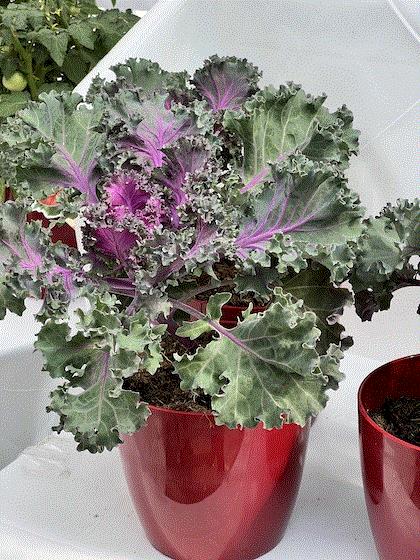
Kale Rainbow Candy Crush
Bill: Last, but not least, at Suncrest was an Israeli nursery called Nir. They’re known for the Australian native chamelaucium, better known as wax flower. These have dainty little flowers in many colors that cover long stems. They can be grown as a drought-loving landscape plant or for cut flowers. At the moment, they’re looking for a North American grower partner, so if you’re in the market (and in the climate) for a drought-tolerant Australian native and want to pick up a cool line, get in contact with Nir.
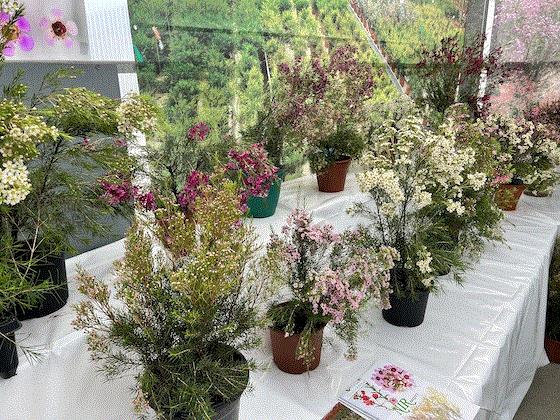
Chamelaucium, better known as wax flower.

Benary Annuals, Perennials, Edibles & Cuts
Chris: Benary, the final stop of our 2022 California Spring Trials trip, is always one of our favorites, with good flowers, good displays, good food and good liquid refreshments—a fitting way to end our five-day trip. And talk about a flower display! They rolled out an enormous outdoor display of early spring violas, pansies, primula, bellis and argyranthemum—more than at all the other trials we visited combined, I’d guess. And in packs, no less! In the greenhouse, more of the same, with row after row of packs on benches … it almost took me back to 1994 and my first Pack Trials. As I mentioned before, the only thing missing was multiple sowings to show timing.

Bill: When it comes to annuals, we all know Benary is a begonia powerhouse and we saw a lot of them, from pack-types to their famous Nonstops. Not much new for 2022, alas, but what they did have is a good one in the Whopper series: Whopper Green Leaf White, the first white for the Ball Seed-exclusive series. The equally popular Big series (which doesn’t grow as big as Whopper) didn’t have any new colors, but Benary did showcase a full retail concept, complete with tags, signage and cardboard shipper racks, which would help call the series out in garden centers of all sizes, should any grower or retailer choose to adopt the idea.
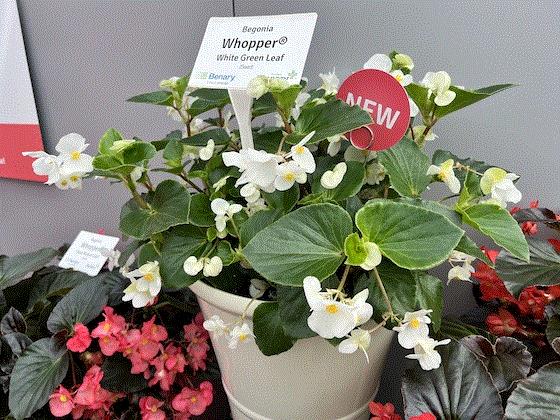
Whopper Green Leaf White Begonia
Chris: Benary’s biggest intro for the year—at least based on the amount of real estate they devoted to it—is Ptilotus Matilda, a much bigger version of Ptilotus Joey, an Australian native. Benary’s view was why are we trying to shrink this plant? If it wants to be big and vigorous, let’s make it big and vigorous! Joey’s wild and crazy big sister can be used in gallons, as a landscape plant, or even as a cut flower. In fact, the blooms will last up to 19 days in a vase (provide you strip off the foliage). Much of the beautiful Matilda display was devoted to flower bouquets featuring the pretty silver-lavender flowers.
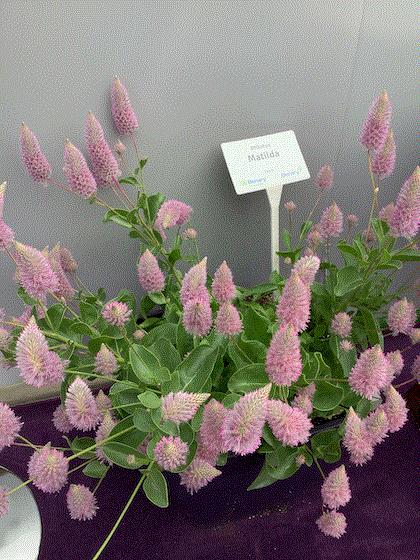
Ptilotus Matilda
Bill: How about herbs, boss? It was kind of surprising (at least for me) to see culinary herbs at Benary. They actually have quite a large assortment and many were displayed under the label “Season Me!” In Europe, herbs have to be “bio,” the European designation for organic, and Benary is working to fill the needs of that market and wanted to show off their herb capabilities to the U.S. market.
Chris: Last year, and again this year, Benary emphasized their Be Green program, their new focus on making their seed enhancement processes environmentally friendly, removing harmful chemicals and microplastics from the priming, pelleting, coating and other enhancements. Benary feels it’s the right thing to do if we want to call ourselves “the original green industry.”
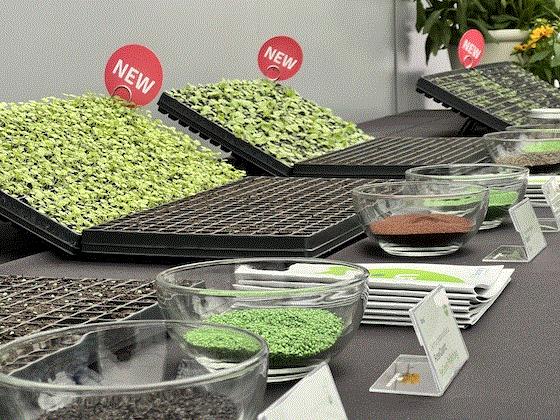
Bill: I’ll wrap up with a few more annual additions: Petunia Success HD (their high-density seed petunia) gets Salmon and a new White Improved. Petunia Success 360, which is more vigorous, gets a new Pink. Their pentas series Graffiti 20/20 gets a pretty Appleblossom. The vegetative verbena series Vectura gets two bicolors, Rose Wing and Purple Wing. Both feature white eyes. And in pansies, the Cats Plus series is an overall upgrade to the whiskered Cats series (which used to be known as Whiskers), with better genetics for more uniformity and overall quality.
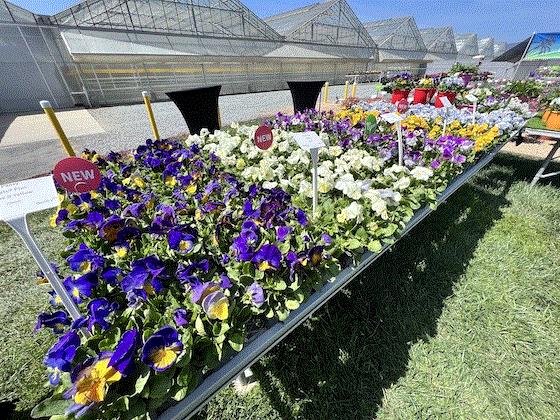
Pansy Cats Plus
For a close look at all the Benary varieties, watch our fabulous VIDEO!

And ... That's a Wrap!
Chris: Whew! That’s a wrap, as we say in the video busines. Speaking of which, note that our Spring Trials 2022 playlist contains every video we shot this week—26 total! CHECK THEM OUT! They're in spectacular 4K technicolor!
Bill, any last thoughts from our five days on the road?
Bill: I bet we’ll look back in the near future and see some gamechangers come out of the 2022 trials. Sometimes it takes a few years to find the gems. I did see a lot of positioning messages that might not be considered “new,” but when breeding companies can reorganize assortments and bring solutions to growers trying to time crops more accurately or slot products into different sized pots and packages, plants become more accessible to consumers and the tide rises for all ships.
Chris: For me, it was a week of good moods and anticipation of a good season (even though I’ve heard from at least one major grower that the season seems to be breaking a bit slowly due to weather). Looking back over the week, I can’t recall any individual introduction that’s going to change the industry, but as you mention, all the breeders are busy improving their genetics to make their products more efficient, more sustainable and more exciting for consumers, meaning our future looks bright.
Thanks for following along, and we'll see you again via our day jobs of GrowerTalks, GreenProfit, Acres Online and Tech on Demand.






Thanks for reading! See you next time,
Chris, Jen & Bill
Chris Beytes
Editor
GrowerTalks/Green Profit
Jen Zurko
Managing Editor
GrowerTalks/Green Profit
Bill Calkins
Senior Editor/Digital Editor
GrowerTalks/Green Profit
This email received by 31,299 lucky folks, and you're one of them!
Want to be one of the lucky sponsors who reach those 30,976 readers of Acres of Buzz from Spring Trials? Drop Paul Black a line and he'll tell you what a bargain it is!